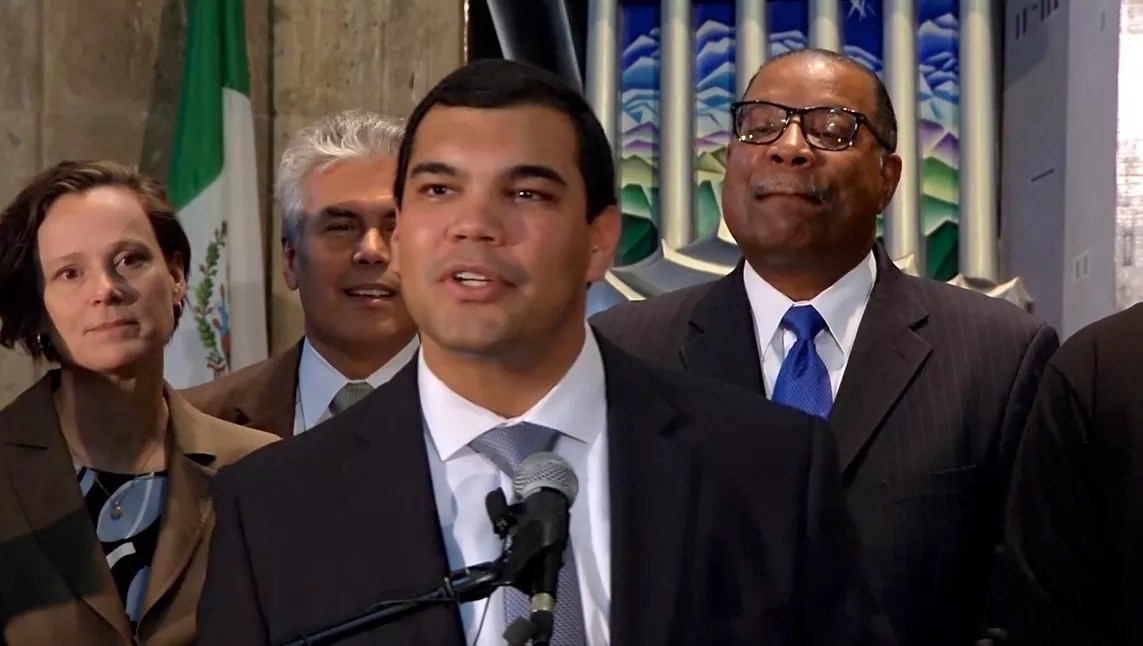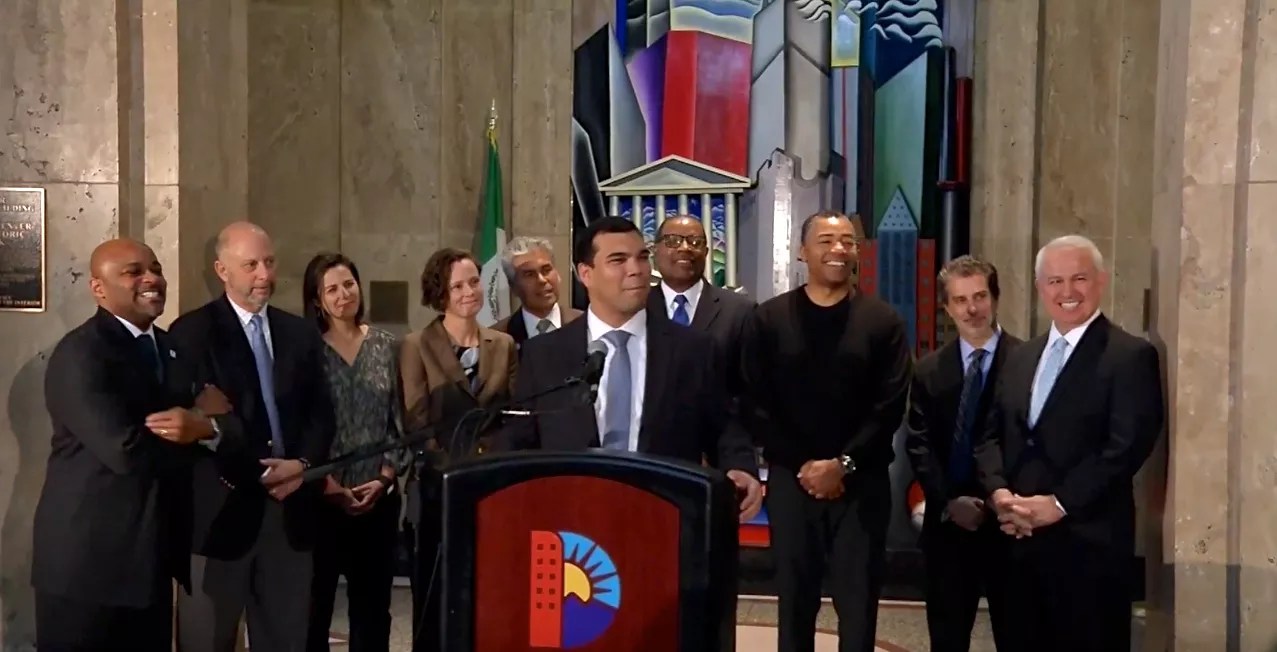

Audio By Carbonatix
Erik Soliván is Denver’s latest hope when it comes to bridging the gap between homelessness, affordable housing and home ownership; even the name of his department, the Office of HOPE (Housing and Opportunities for People Everywhere), suggests as much.
In January, Soliván was selected to head up the new department after the HOPE office was announced by Mayor Michael Hancock in last year’s State of the City address. The Philadelphia transplant and former senior vice president of the Philadelphia Housing Authority has already had a busy few months; Soliván is being tasked with examining the whole spectrum of housing-related issues, from homelessness to housing, and has parachuted into Denver at a time when rents are skyrocketing and the mayor’s administration faces criticism and lawsuits over its homeless sweeps and enforcement of the urban-camping ban. That includes a case in federal court in which a judge granted class certification to thousands of homeless plaintiffs challenging the constitutionality of Denver’s homeless sweeps.
Recently, Westword caught up with Soliván to find out how he’s handling the transition and what he can share about future plans. The director says that his first three months in Denver have involved a lot of listening.
“My years in affordable housing and community development and services [in Philadelphia] don’t necessarily apply here in Denver, so a lot of these first three months has been spent listening and learning,” explains Soliván.
That listening tour has included feedback from community members, homeless advocates, government agencies and nonprofits. Based on what he’s heard, Soliván aims to roll out a number of pilot programs designed to alleviate pressures on Denver’s more vulnerable citizens and put them on a path to stable housing.
“So part one is listening and learning. Part two of this is: How do we deliver on some pilot initiatives as well as better organize ourselves in the city to deliver on short-term actions?” he says.

Drawing on his upbringing, Soliván says that he understands how it takes partnerships among residents, government agencies and nonprofits to prop up economically distressed communities.
Born when his mother was 19 and his father was 21, Soliván grew up in Section 8 housing in a blue-collar area of north Philly called Hunting Park. Soliván’s father was a non-unionized worker at a box-cutting factory, spending his days inserting heavy mats of paper into steel die-cutters and hammering them into boxes. His mom worked as a secretary at the Federal Reserve.
“The very small apartment that we first lived in in Hunting Park wasn’t the best place, but it was home,” recalls Soliván. “I remember the days of going to churches to get food because that was where the food banks were.”
And yet Soliván’s parents felt determined to improve their economic situation, and both went to night school for years until they earned degrees to become teachers. Soliván says that he’s already drawn parallels between his parents and folks he’s met in parts of Denver.
“You see that same inspiration and that hope in a lot of families throughout this city – particularly in places like Globeville and Elyria-Swansea, where families are working hard to make ends meet, and it’s a struggle, and there’s a lot of change going on in the community,” he says.
Soliván remembers how his parents took advantage of a coalition of service providers and community members in Philadelphia to help improve their stability. “They relied on other family members and the community, on churches, on nonprofits and on government,” he says.
One of Soliván’s first challenges is revitalizing the Mayor’s Commission to End Homelessness, which consists of over forty service providers, politicians and experts on homelessness but has been plagued with problems – mostly around commission members feeling like the group is directionless and that its members aren’t receiving proper notification or consultation around policing actions like the homeless sweeps.
“What we’re trying to do now is have the commission find a vision of where they want to go,” says Soliván. “Over the next two months, we’re having working groups and meetings, and hoping to get to a point where we can announce a new, re-formatted commission.”

Erik Soliv
chris walker
Soliván dispels any speculation that the new HOPE office will replace Denver’s Road Home, the city department that currently oversees homeless services, but says it will instead act in tandem.
“Denver’s Road Home stays; it plays a critical role,” says Soliván. “And [its director] Bennie [Milliner] will also continue to play a vital role on the commission. He is a good man who has a heart for this work.”
Soliván hasn’t shied away from meeting with some of Denver’s most outspoken and critical homeless advocates, including those with the organization Denver Homeless Out Loud. Members with that group have told Westword that they have appreciated Soliván’s candidness, even if they are still critical of some of his actions.
For instance, Soliván drew DHOL’s criticism for being one of four individuals who testified against the Right to Rest Act, which aimed to outlaw anti-homeless ordinances throughout Colorado, when it came before a Colorado House committee at the State Capitol on April 19. The bill was subsequently voted down eight to five at the end of an emotional ten-hour hearing.
“My testimony against the Right to Rest bill was that we need to ensure that localities have that authority to ensure public health and safety,” explains Soliván. “I fully understand, and am continuing to learn from advocates, about the need to rest, and that is true. But at the same time, the issue is not expanding the time of rest; it’s how do we turn that rest into a home? How do we move that individual into affordable housing? That’s what we’ve got to be focusing on, and that takes time.”
Rather than change controversial laws, like the camping ban, Soliván says that he is trying to build upon constructive initiatives, such as the $150 million, ten-year proposal to build 6,000 affordable units that was approved by Denver’s City Council last year.
“We have a list of about seven or eight different small initiatives that we’re thinking of rolling out in the coming weeks – some of them at the Mayor’s Housing Summit,” says Soliván.
He cites the city’s decision to allow a tiny-home village in RiNo as a recent example.
Other initiatives he hopes to introduce include a storage program through which people experiencing homelessness can securely store their belongings while they stay in overnight shelters, as well as a peer-to-peer outreach program that will connect people in the homeless community to services – “rather than just well-trained government agents going out,” says Soliván.
“[The peer-to-peer] program is going to be a way to build a broader network of connectivity between people experiencing homelessness,” he says. “They can look at someone in the eye who has experienced homelessness as well.”
Soliván says that the city has been looking at ways to improve the safety and quality of the city’s overnight shelters. He cannot share the specifics of those initiatives yet, but he hopes to unveil more information at the Mayor’s Housing Summit on May 19.